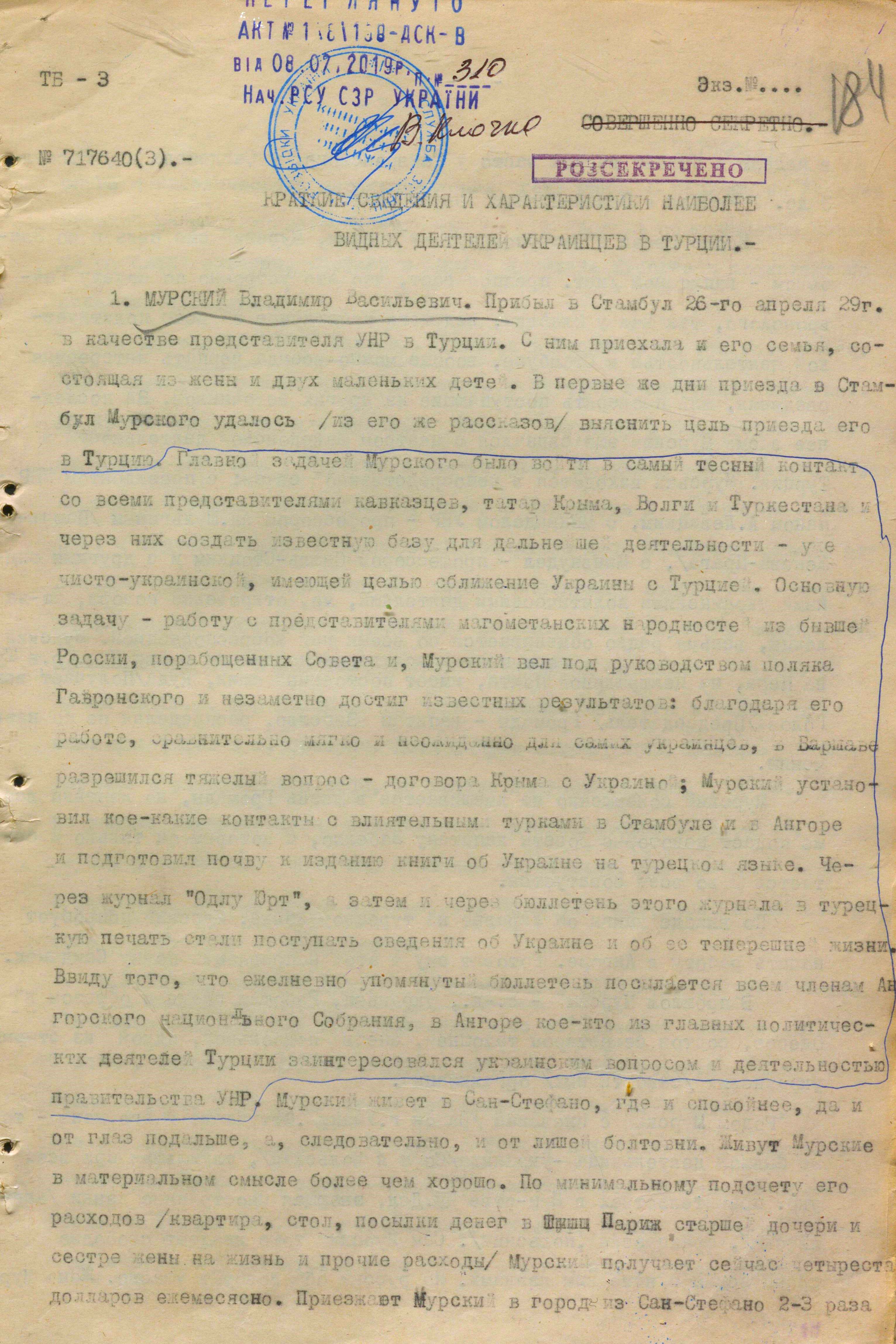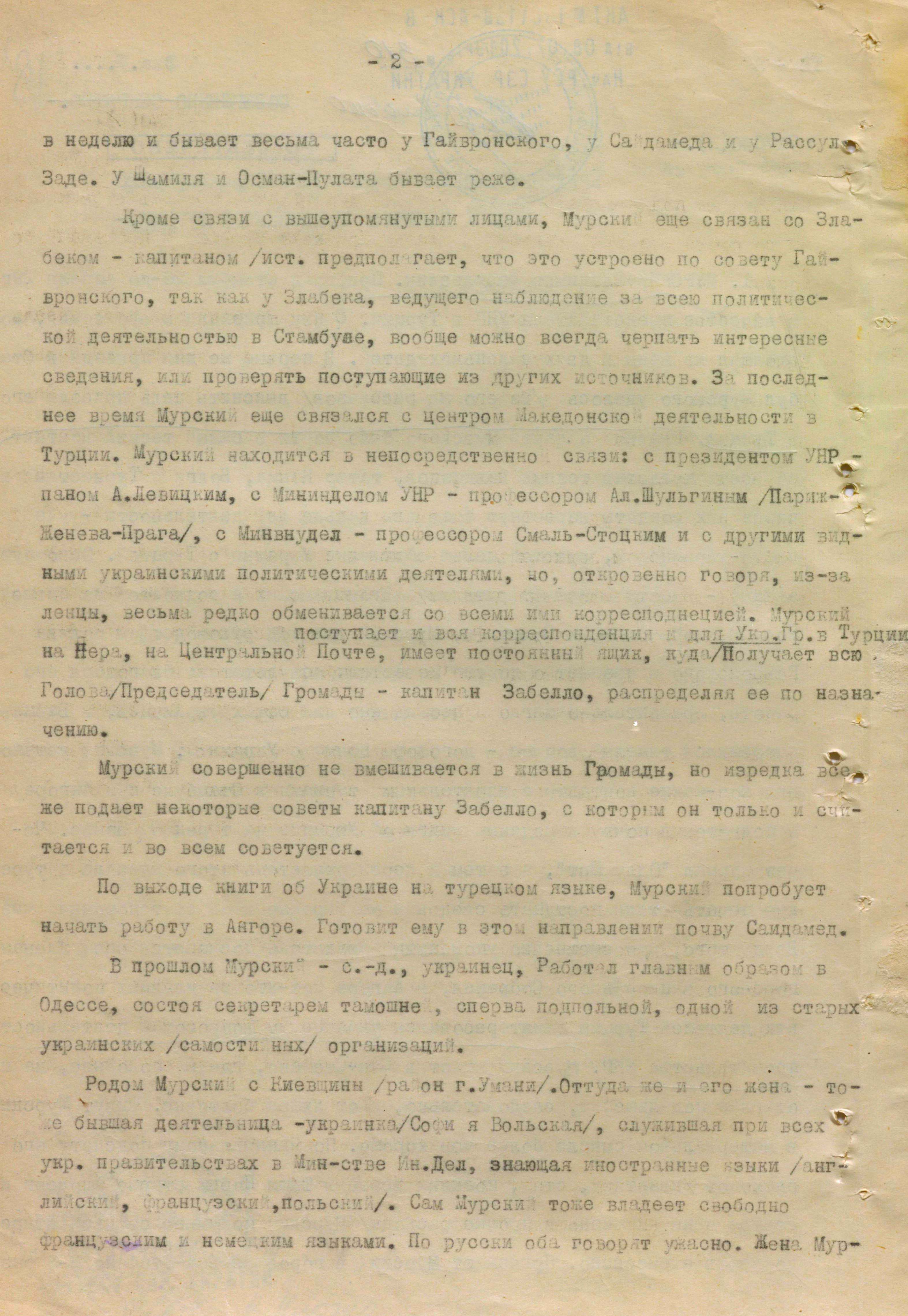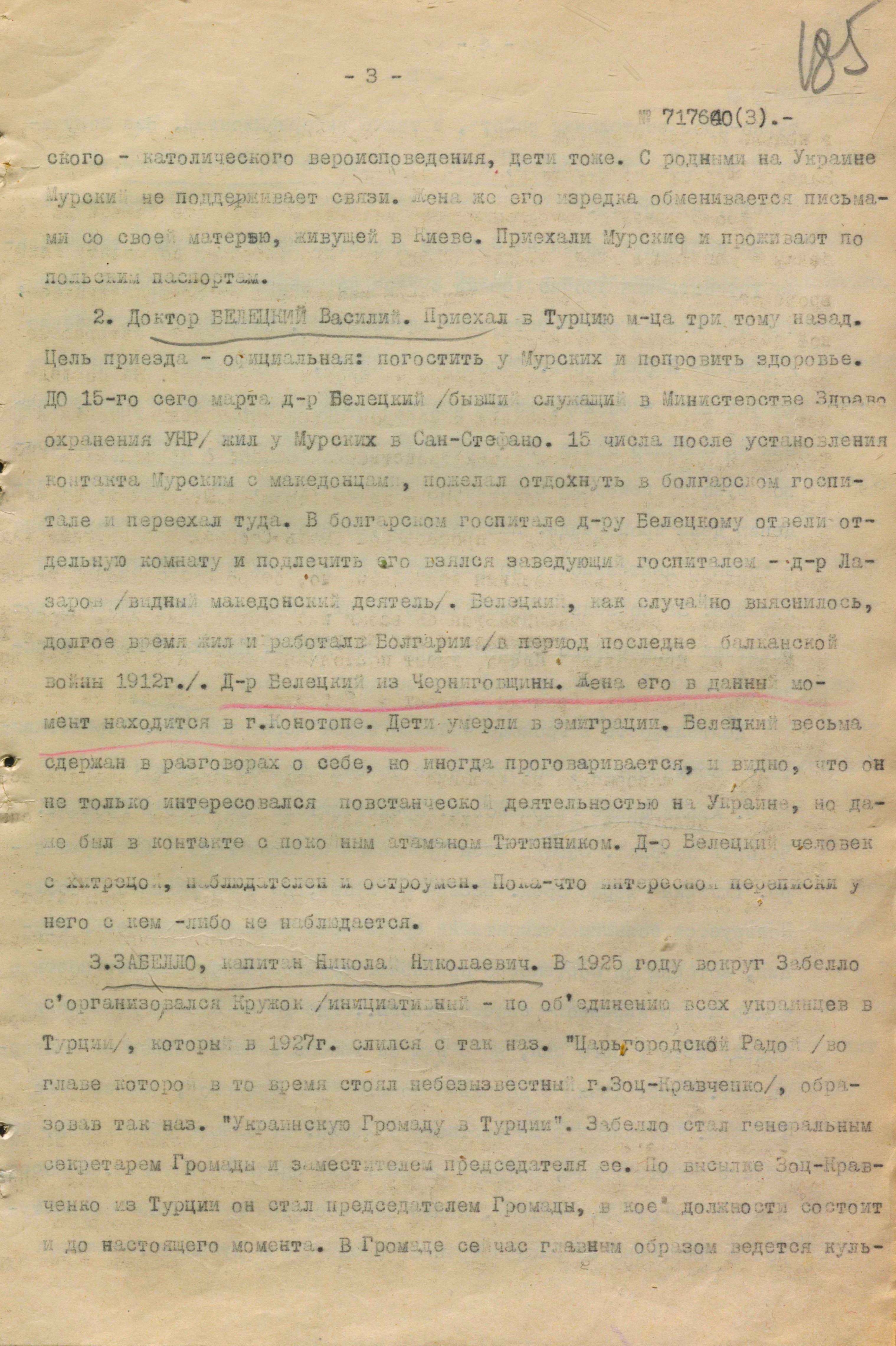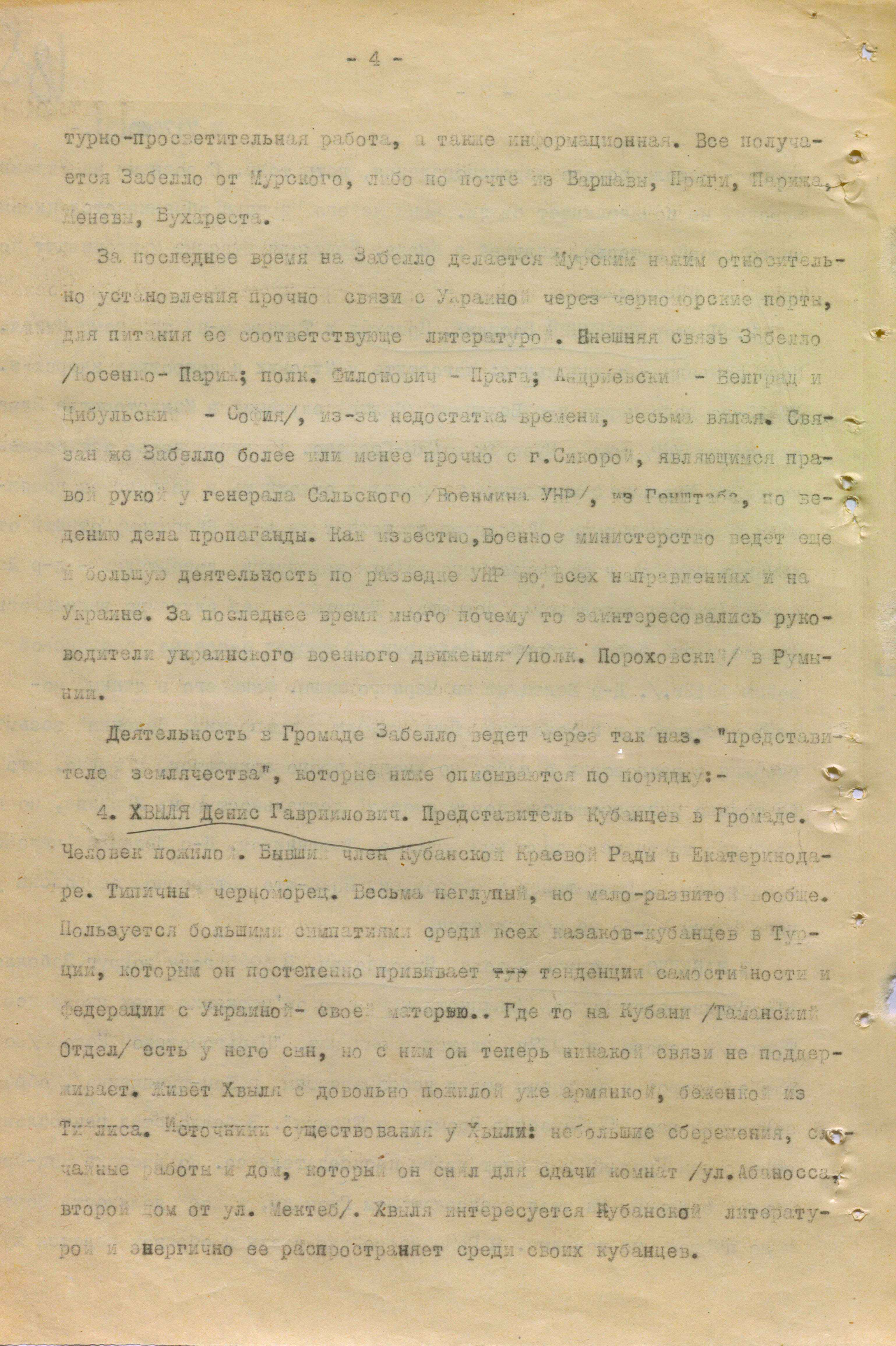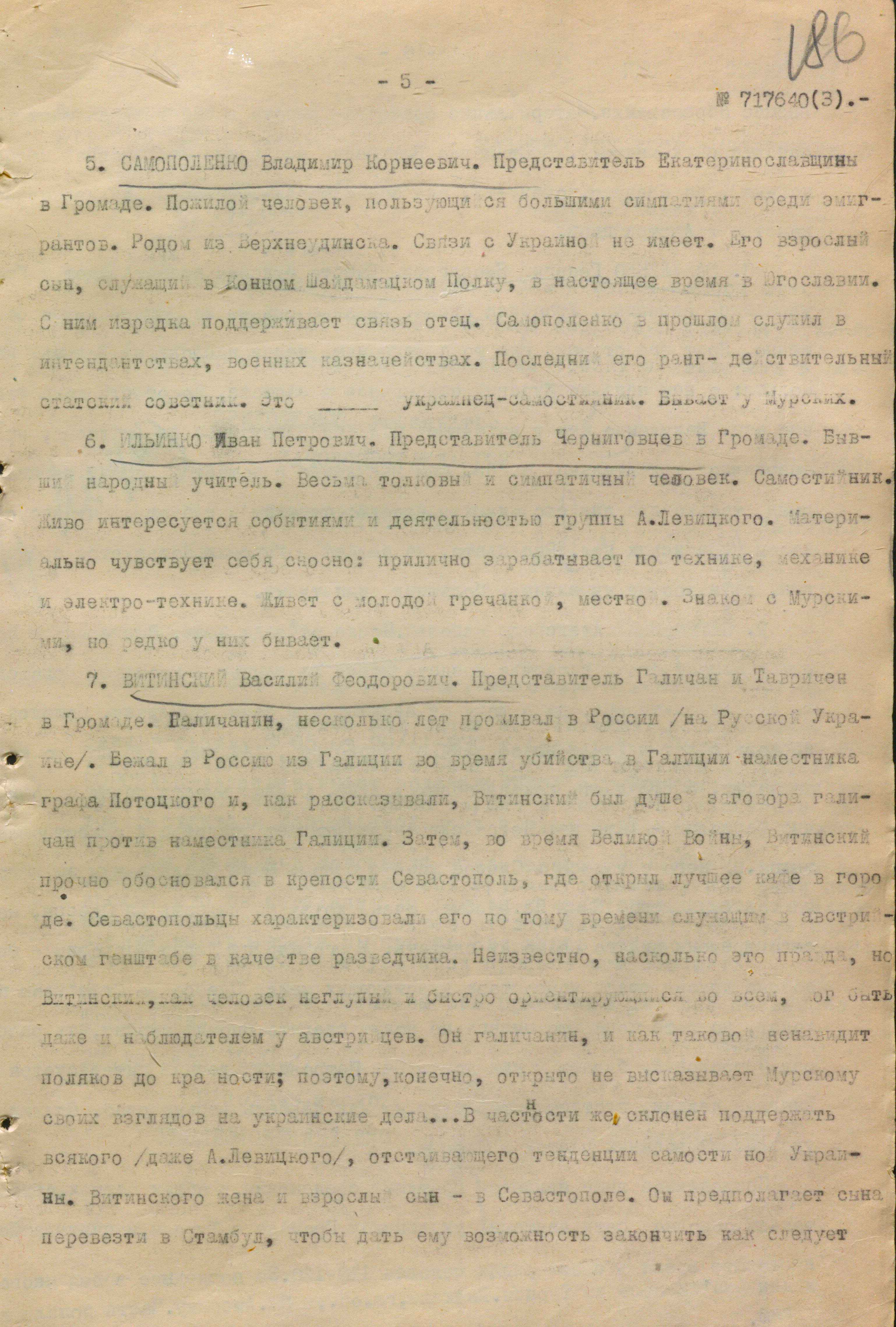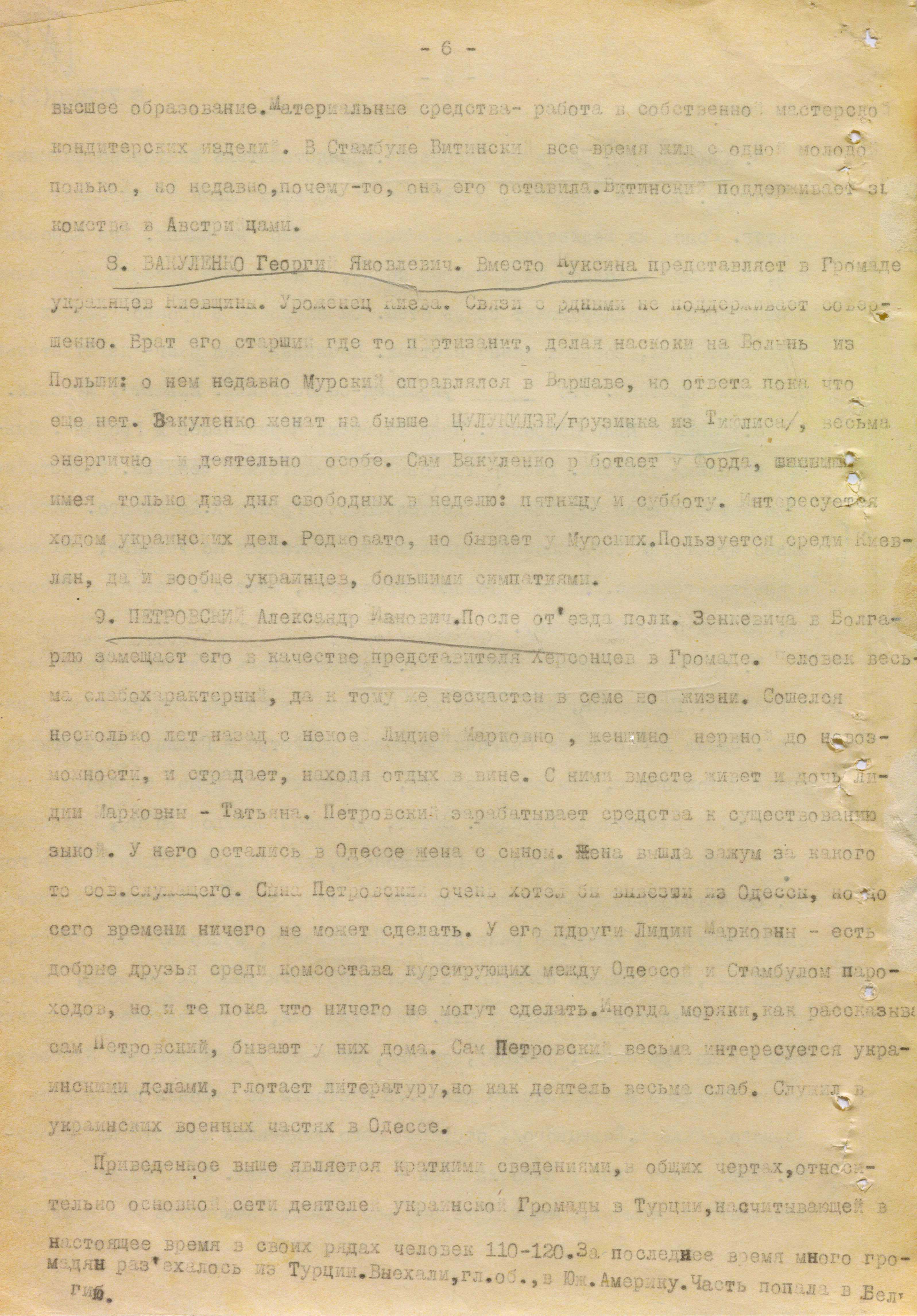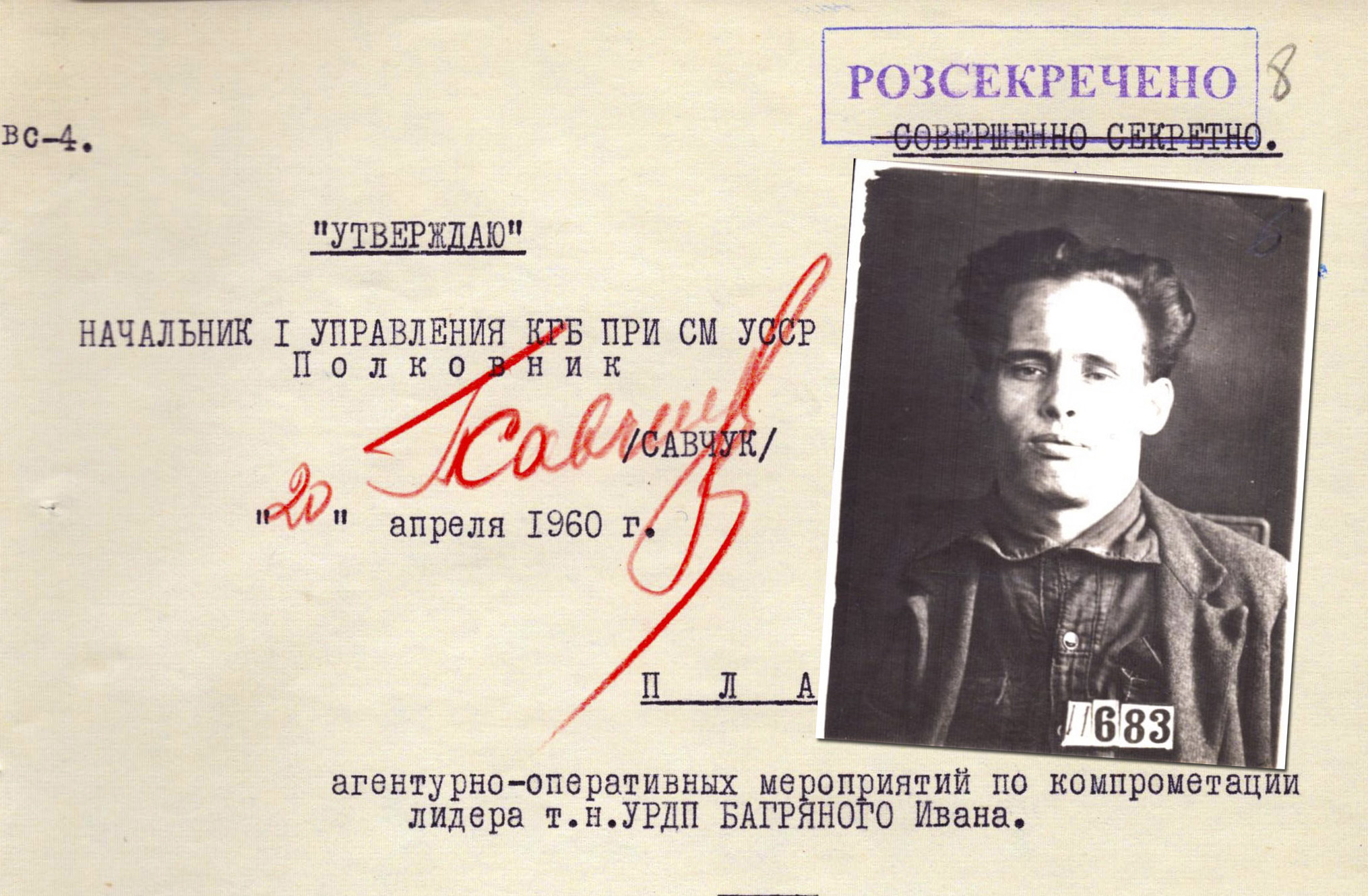Volodymyr Murskyi. “Ukrainian Nuncio” in Istanbul
6/15/2021
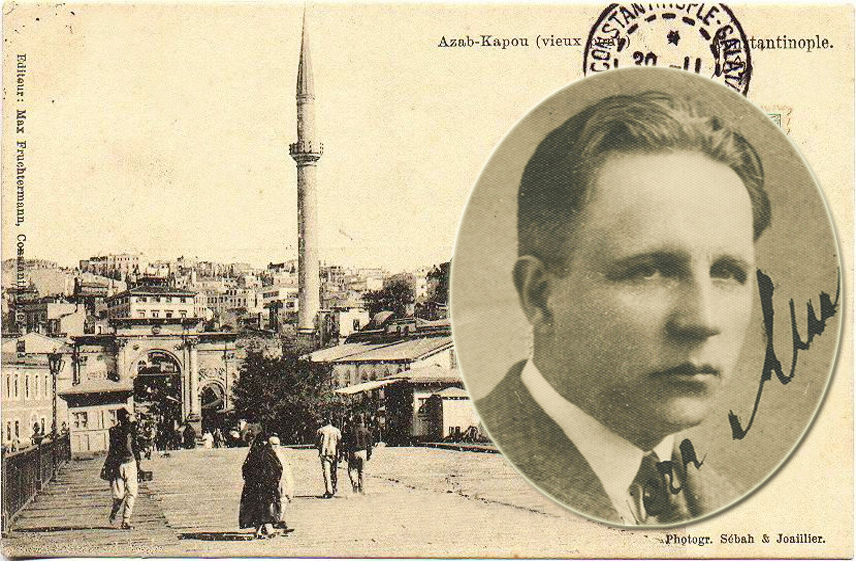
In the early 1930s, the UPR government in exile returned to the issue of obtaining autocephaly and establishing a local autocephalous church in Ukraine. An important role in this process was played by Volodymyr Murskyi, who at that time was the official representative of the UPR government in Turkey and performed certain tasks of the UPR’s intelligence, as evidenced by declassified documents from the Branch State Archive of Ukraine. Following the meeting of the Ukrainian delegation with Patriarch Photius II of Constantinople, Deputy Prime Minister and Minister of Internal Affairs of the UPR government in exile Oleksandr Lototskyi praised Volodymyr Murskyi’s efforts and called him a “Ukrainian Nuncio” in Istanbul, by analogy with the rank of the highest diplomatic representative of the Holy See.
V. Murskyi's activity in the diplomatic sphere was noticed by the GPU-NKVD of the USSR. In archival documents concerning figures of Ukrainian emigration in Turkey, his name is mentioned time and time again.
Turkey in general was of special interest to the UPR government in exile. After 1920, many thousands of Ukrainians emigrated there. Soon, all the scattered Ukrainian communities merged into a single center, through which the leaders of the UPR’s special services resolved many intelligence and counterintelligence tasks. In particular, the sea connection with Odesa via Istanbul made it possible for steamships to deliver to the Ukrainian SSR special literature produced by the propaganda section of the Ministry of Military Affairs of the State Center of the Ukrainian People's Republic and to receive information on the state of affairs in Ukraine.
According to archival documents, agents of the Soviet intelligence later learned about those plans and decided to conduct their own special operation. It was developed and implemented by the Foreign Department of the GPU of the Ukrainian SSR under the control of the OGPU of the USSR. The UPR's intelligence officers also tried to play their part, constantly doubting the safety of the Istanbul-Odesa-Istanbul route and resorting to their internal inspections, with some suspicions about individuals in the leadership of the Ukrainian community.
Eventually, Vsevolod Zmiyenko, the Chief of the UPR's Intelligence, persuaded the Minister of Military Affairs, Volodymyr Salskyi, to send to Turkey the experienced Volodymyr Murskyi as his representative. In addition to his direct duties, he had to perform some specific tasks.
This change was immediately noticed by the Soviet secret services. This is evidenced by the report of the Foreign Department of the GPU of the Ukrainian SSR entitled “On the UPR’s Activities in Turkey”. It states: “According to the information available in the Foreign Department of the OGPU, Ukrainian emigration circles in Turkey have recently become significantly more active. As a result of intensified activities, March 15, this year, the temporary representation there was reorganized into the permanent representation of the Ukrainian People's Republic in Turkey, headed by Murskyi, in the past one of the leaders of “independentists”’ organizations in Odesa. Murskyi is directly connected with the President of the Ukrainian People’s Republic Andriy Livytskyi, Ministers Shulhin, Prokopovych and General Salskyi. He receives literature and work instructions from them. Remaining the center of all Ukrainian work in Turkey, he is connected with all representations of emigrants from the Caucasus in Turkey. Of great interest in this regard are Livytskyi’s and Shulhin’s letters addressed to Murskyi, which cover the international situation from the point of view of the UPR” (BSA of the SZR Ukraine. – F.1. – Case 12628. – Vol.5. – P. 134).
In another document of the GPU of the Ukrainian SSR, dated October 3, 1930, entitled “Ukrainian Community in Istanbul”, V. Murskyi is already mentioned in more detail: “Volodymyr Petrovych Murskyi comes from Polish Ukrainians of Podillya. He is a former socialist-revolutionary, a friend of Marshal Pilsudski, a former high school teacher in the province and a newspaper correspondent. The man is quite cunning and active. He is in Istanbul as a writer and correspondent of the League of Nations, but de facto he is an agent of the Poles and the UPR. Works with the Polish mission and Assistant Military Attaché of the French Embassy – Captain Marcel Denardu. Murskyi has good agents in Ukraine, in particular among the sailors of Soviet steamers who come to the port of Istanbul, and here he contacts them for information”. (BSA of the SZR of Ukraine. – F.1. – Case 12628. – Vol.2. – P. 221).
Today, domestic historians have studied in more detail the biography of V. Murskyi, who can rightly be considered one of the prominent representatives and promoters of the Ukrainian national cause abroad in the interwar period.
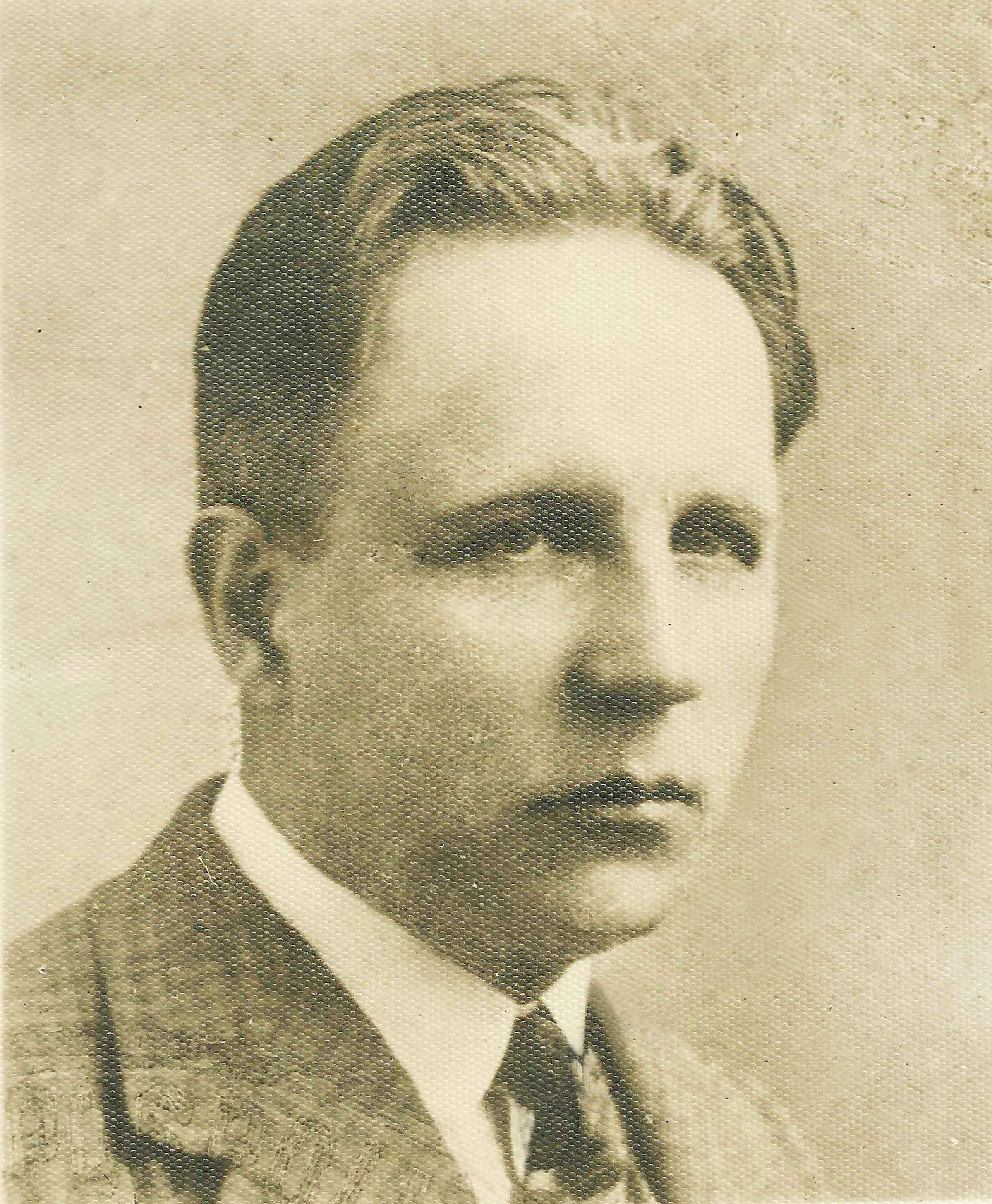 Volodymyr Murskyi was born on November 10, 1888 in Galicia. He received a higher philological education and a specialty of public school teacher, having graduated, according to some sources, from the Faculty of Philosophy of Lviv University, where at that time teachers for high schools were trained.
Volodymyr Murskyi was born on November 10, 1888 in Galicia. He received a higher philological education and a specialty of public school teacher, having graduated, according to some sources, from the Faculty of Philosophy of Lviv University, where at that time teachers for high schools were trained.
After graduation he worked as a teacher, at the same time taking an active part in the activities of the Lviv “Prosvita” society. In 1917–1918, he actively promoted the national-state and cultural policy of the Ukrainian Central Rada, editing together with the Ukrainian public and political figure Ivan Lypa the “Ukrainske Slovo” (“Ukrainian Word” – transl.) magazine in Odesa. Soon he found himself in exile.
In Vienna he worked as a press assistant at the UPR’s Embassy. At the same time he lectured for workers and prisoners of war and participated in the formation of the “Union of Ukrainian Journalists”. In Poland, he was the Acting Director of the Press and Information Department of the Ministry of Press and Propaganda of the UPR government in exile. At that time he was responsible for printing and distribution in the diaspora, as well as in the territory of the Bolshevik Ukraine of periodicals in the Ukrainian language, which promoted Ukrainian independence. He was an active member of the Prometheus movement, whose goal was to organize a joint struggle of the peoples of the former Russian Empire and the USSR, enslaved by the Bolsheviks, for the formation of independent national states.
The last, quite eventful period of his life was during his stay in Istanbul in 1929–1935. The main direction of work in that period is generally reflected in one of the documents of the GPU of the Ukrainian SSR entitled “Brief Information and Characteristics of the Most Prominent Ukrainian Figures in Turkey”. It reads: “Murskyi Volodymyr Petrovych. Arrived in Istanbul on April 26, 1929 as a representative of the UPR in Turkey. He was accompanied by his family, which consists of his wife and two small children… Murskyi's main task was to enter into the closest contact with all representatives of the Caucasians, Tatars of Crimea, Volga and Turkestan and through them to create the necessary base for further activities – already purely Ukrainian, which aims at bringing Ukraine closer to Turkey… Thanks to his work, relatively softly and unexpectedly for the Ukrainians in Warsaw, a difficult issue was resolved– the agreement between Crimea and Ukraine. Murskyi established contacts with influential Turks in Istanbul and Angora and prepared the ground for the publication of a book about Ukraine in Turkish” (BSA of the SZR of Ukraine. – F.1. – Case 7408. – Vol.1. – P. 270).
There are several references to this agreement in the correspondence. It is said that V. Murskyi established close relations with the leaders of the Crimean Tatar diaspora in Turkey, in particular with Jaffar Seydahmet (Kirimer). The result of this cooperation was the development and coordination with the leadership of the UPR government in 1932 of a draft agreement on the establishment of the Union State of Ukraine and Crimea. This project provided for mutual recognition of independence of the UPR and the Crimean Republic and establishment of a common union state after overthrowing the Bolshevik regime. Despite the fact that this is only a working document, which remained at the level of declarative intentions, this episode shows the remarkable skill of V. Murskyi as a diplomat who knew how to build bilateral relations, listen and persuade opponents.
In addition, archival documents repeatedly mention the UPR representative’s contacts with German, French and Japanese diplomats and intelligence officers. By making these contacts, he was trying to inform other influential states about Ukraine, its struggle for independence from Moscow, and to gain support in that struggle.
Documents prepared by V. Murskyi and intercepted by Soviet secret services, show that he described the situation related to the Ukrainian issue in a well-argued and intelligible way and outlined ways to resolve it. At this, as a journalist and writer, he made his presentation emotional and philosophical. As, for example, in the material addressed to the Japanese Military Attaché in Turkey Iimura.
“The issue of the independence of Ukraine and other nations oppressed by Russia”, he wrote, “puts on the agenda the question of Russia's existence as a state, a source of constant intrigue and, in the current period of the communist regime, a major factor in economic crisis, destruction of world cultural values and corruption of humanity. The only way out is suggested. The world must understand that the political and economic balance of the whole world cannot be restored until the source of the original intrigues in Europe and Asia, which was at all times tsarist Russia and is now Bolshevik Russia, is destroyed. New political units must be created on the ruins of the Russian Empire or Bolshevik Russia…” (BSA of the SZR of Ukraine. – F.1. – Case. 12628. – Vol.8. – P. 24).
Assessing contacts with the Japanese Military Attaché, the Head of the Council of Ministers of the Ukrainian People's Republic in exile Vyacheslav Prokopovych said in a letter to V. Murskyi: “I consider it my duty to express my sincere gratitude on behalf of the service for all your work, done with such consistency, tact and knowledge, that it allowed to establish these very important contacts, so needed in the future” (BSA of the SZR of Ukraine. – F.1. – Case 12628. – V.2. – P. 93).
An example of high diplomacy is the history of the attempt to get the Ecumenical Patriarchate's agreement to autocephaly of the Ukrainian Orthodox Church.
At the end of May 1930, V. Murskyi was informed about head of the UPR government in exile Vyacheslav Prokopovych’s visit to Istanbul. The main purpose of the trip was to participate in the congress of Orthodox clergy convened by the Ecumenical Patriarch on Mount Athos, where V. Prokopovych was to report on the state of the church in Ukraine and in exile and ask for recognition of the autocephaly of the Ukrainian church.
The visit is described in detail in archival intelligence documents, in particular in the correspondence intercepted by the OGPU of the USSR and reports of secret agents. For example, in the UPR’s Ambassador to Warsaw Roman Smal-Stotskyi’s letter to V. Murskyi, he asked to care about V. Prokopovych's visit: “Mr. Prime Minister instructs you to prepare the Patriarchate accordingly (very carefully) and check the possibility of an audience with the Patriarch” (BSA of the SZR of Ukraine – F.1 – Case 12617. – Vol.15 – P. 264).
The caution in communication and the confidential nature of the visit were not for nothing. Representatives of the Ukrainian People's Republic did not want the Russian Orthodox Church, which at the time was closely controlled by Soviet secret services, to learn about these contacts, and to put untimely pressure on the Ecumenical Patriarchate.
It was not difficult for V. Murskyi to fulfill this important task. After his arrival in Turkey, he began his work to establish close contacts with the Orthodox clergy of Istanbul, realizing that he needed such ties both for purely diplomatic functions and for the Ukrainian cause in a broader sense.
He first met with Deputy Bulgarian Exarch in Istanbul, Metropolitan Boris. Soon this acquaintance grew into friendship. The Metropolitan repeatedly invited V. Murskyi to worship, to honor the Bulgarian community of Istanbul with prominent educators Cyril and Methodius, as well as to his home. Besides, he visited Murskyi's house at his invitation. At lunch, they talked a lot about Ukraine, its history, culture, art, the position of Ukrainians in exile and in Soviet Ukraine. Boris was sincerely concerned about this issue and promised to help Ukrainian emigrants in Bulgaria.
With his assistance, V. Murskyi met with officials of the Ecumenical Patriarchate, and later with Patriarch Photius II. He was repeatedly present at liturgies held in the Cathedral of Constantinople – the Church of St. George in Phanar. Therefore, at the time of the arrival in Istanbul of the Prime Minister of the Ukrainian People's Republic in exile, everything was done to ensure that all planned events took place.
V. Prokopovych arrived in Istanbul on June 8, 1930. Assessing the situation on the ground, he decided to cancel the trip to Greece and focus all efforts on organizing a meeting with the Ecumenical Patriarch.
Such a meeting with Photius II took place on June 12. Along with Vyacheslav Prokopovych, it was attended by Volodymyr Murskyi and Secretary of the Ukrainian community Mykola Zabello. The Prime Minister of the Ukrainian People's Republic in exile presented the Ecumenical Patriarch with a document confirming his authority as a representative of the Supreme Council of Ukrainian Emigrants, as well as a Memorandum signed by himself. It read:
“Istanbul. June 12, 1930
His Holiness Photius II, Ecumenical Patriarch of Constantinople
Your Holiness.
As a delegate of the Supreme Council of Ukrainian Emigrants, I have the honor to draw Your Holiness's attention to the following facts:
1. The current situation of the Orthodox believers of Ukraine does not allow them to satisfy their religious needs and to organize their spiritual life, as well as to freely express their will.
Ukrainian emigrants who are currently outside their homeland consider it their duty to ask Your Holiness not to refuse to pay favorable attention to the religious life of Ukraine. This life must develop after the restoration of independence of our homeland and restoration of spiritual relations with the Ecumenical Patriarchate in accordance with historical traditions, as well as in accordance with the will of the nation must form the Autocephalous Church in an independent state.
2. Religious feelings and the need to meet spiritual needs are of particular importance to Ukrainian emigrants. Ukrainians, separated from their homeland and scattered all over the world, form numerous parishes, numbering thousands of believers who gather around them.
Ukrainian emigrants, traditionally devoted to the holy Orthodox religion, would be indescribably happy to find the Ecumenical Patriarch’s protection, under whose guidance their spiritual life could develop and meet their spiritual needs.
So, the Supreme Council of Ukrainian emigrants is asking Your Holiness not to refuse to take under your protection Ukrainian believers in Western and Central Europe, and to consider them your people from now on.
Delegate of the Supreme Council of Ukrainian Emigrants
Vyacheslav Prokopovych”
(BSA of the SZR of Ukraine. – F.1. – Case 12617. – V.1. – P. 27).
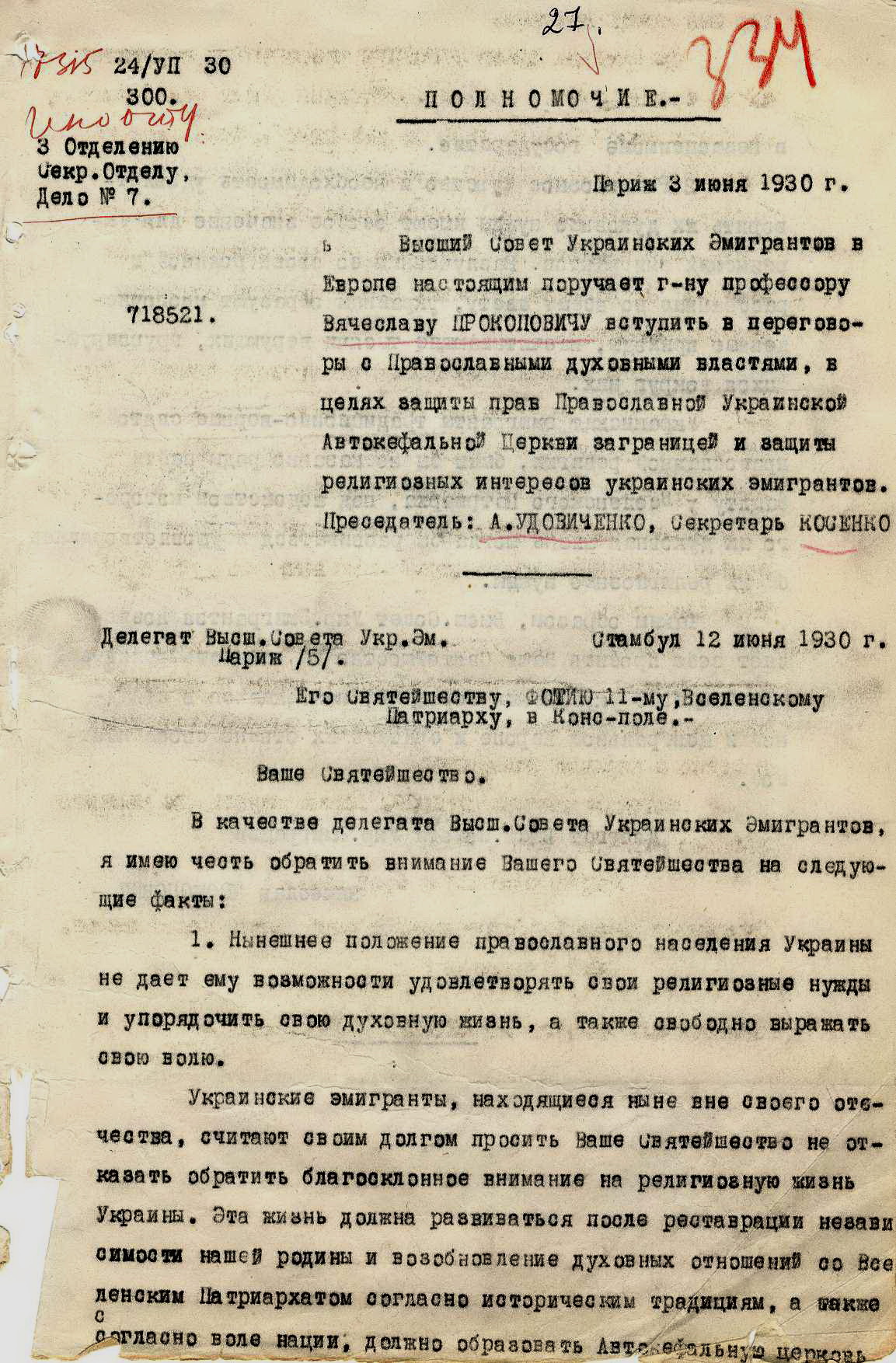
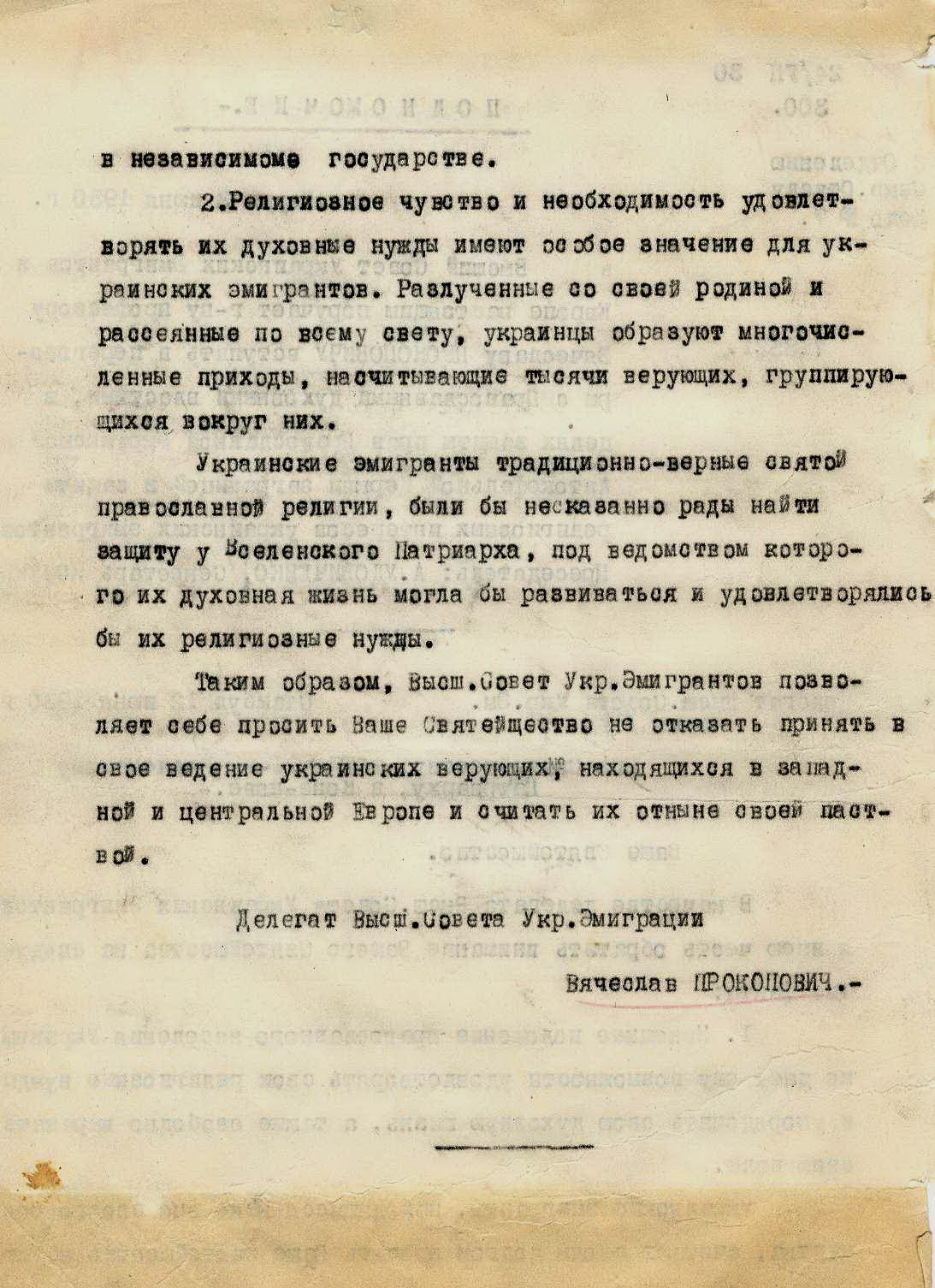 According to V. Prokopovych's testimonies reflected in the archives, the Ecumenical Patriarch gave a positive answer to both points of the Memorandum and promised all possible assistance in resolving the issue of the Ukrainian church, including its consideration in the Holy Synod.
According to V. Prokopovych's testimonies reflected in the archives, the Ecumenical Patriarch gave a positive answer to both points of the Memorandum and promised all possible assistance in resolving the issue of the Ukrainian church, including its consideration in the Holy Synod.
Recalling this meeting in a letter to O. Lototskyi, V. Prokopovych pointed out that everything went very well, that the Ecumenical Patriarch blessed all Ukrainian emigrants, and promised to inform about further actions through V. Murskyi, whom he called “mein Freund” (“my friend”) because they spoke German.
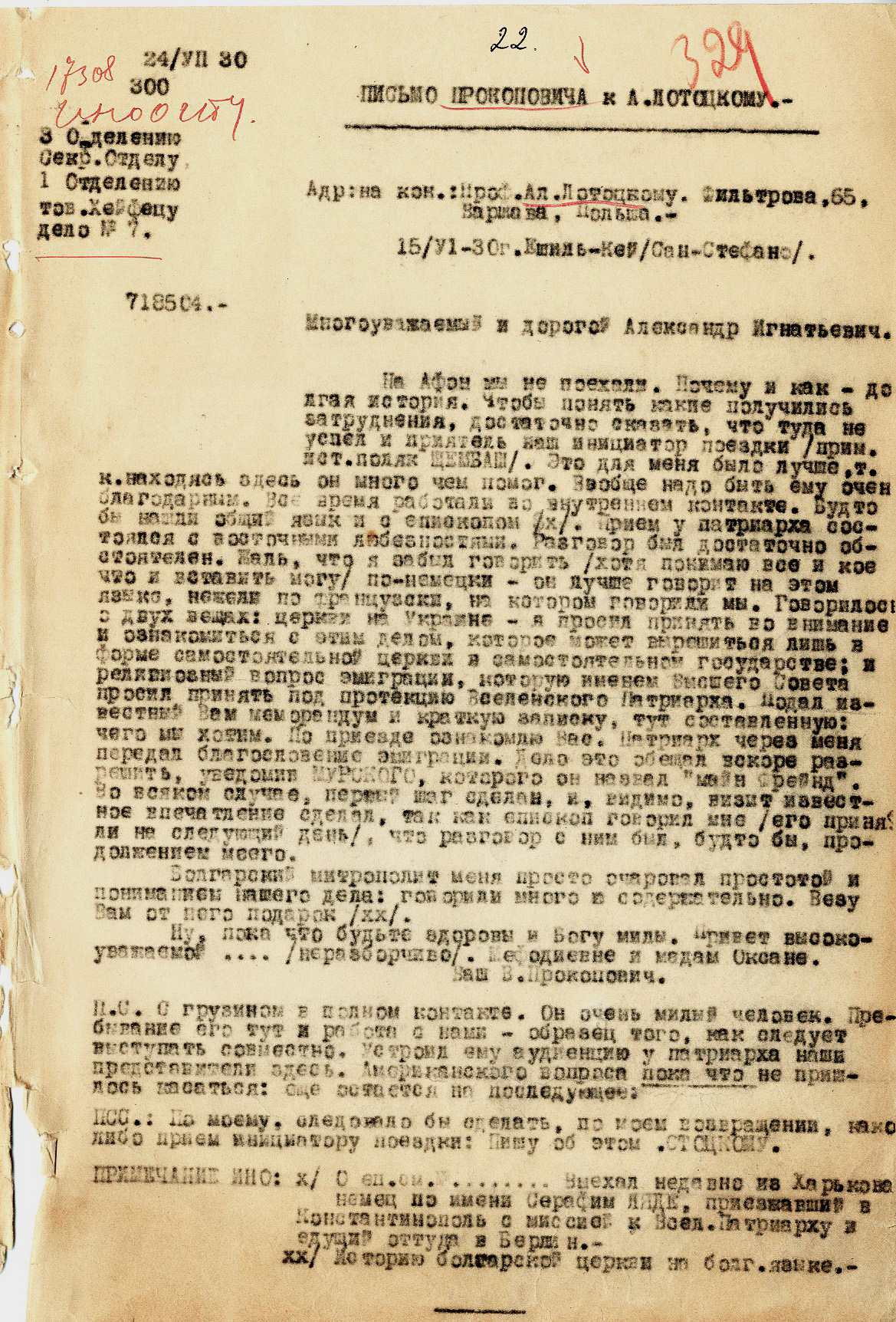 The Ukrainian government was very grateful to V. Murskyi for organizing the audience. To develop contacts, head of the State Center of the Ukrainian People's Republic in exile Andriy Livytskyi and Minister of Military Affairs Volodymyr Salskyi were to arrive in Istanbul a month and a half later. However, their visit did not take place for a number of reasons.
The Ukrainian government was very grateful to V. Murskyi for organizing the audience. To develop contacts, head of the State Center of the Ukrainian People's Republic in exile Andriy Livytskyi and Minister of Military Affairs Volodymyr Salskyi were to arrive in Istanbul a month and a half later. However, their visit did not take place for a number of reasons.
Then V. Murskyi personally communicated with the Ecumenical Patriarch many times in the future. Taking the opportunity, he presented him with a copy of his new book, “Ukraine and Its Struggle for Independence”, published in Turkish. The Patriarchate soon received a request from the Ukrainian people of America to take the Ukrainian Autocephalous Church of America under the direct authority of the Ecumenical Patriarch. V. Murskyi was assured that the issue of granting autocephaly would be considered at the next Ecumenical Council, which was to take place in early 1932. In this regard, V. Murskyi prepared a special memorandum.
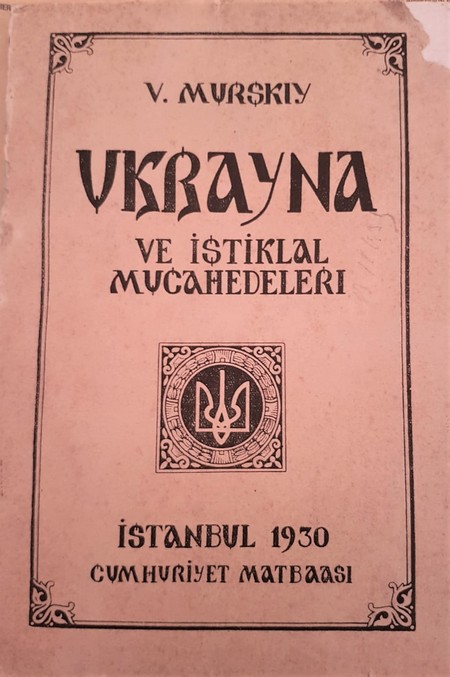
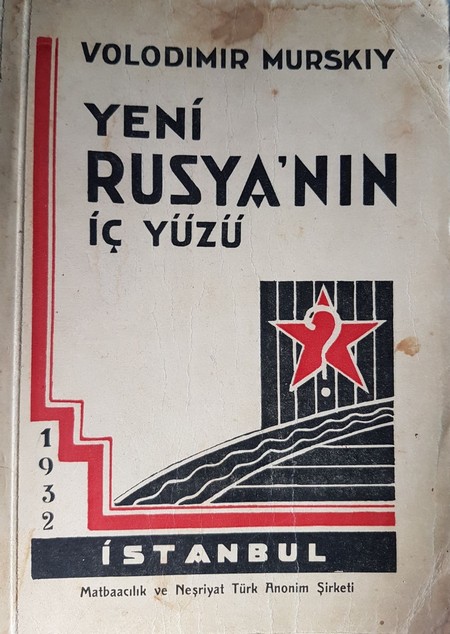 But the consideration of these issues important for the Ukrainian church kept being postponed for various reasons. Eventually, after the untimely deaths of Photius II and V. Murskyi in 1935, who died almost simultaneously, these issues were finally removed from the agenda.
But the consideration of these issues important for the Ukrainian church kept being postponed for various reasons. Eventually, after the untimely deaths of Photius II and V. Murskyi in 1935, who died almost simultaneously, these issues were finally removed from the agenda.
Nevertheless, Volodymyr Murskyi remained in Ukrainian history as a multifaceted figure, a talented diplomat and intelligence officer, educator, journalist, writer, public and political figure who sincerely and persistently promoted the history of Ukraine abroad, advocated the need to restore Ukrainian independence and destroy Bolshevism. He wrote about this in his second book, “The True Face of the New Russia”, published in 1932.
“The Muscovy’s oppression lasted for two centuries”, wrote V. Murskyi in this book. “It did its best to undermine the strength of the Ukrainian people, but never managed to destroy it. And today, despite the seemingly political and economic collapse, the Russian authorities' denial not only of Ukrainian peculiarities, but also of the very fact of the existence of Ukrainians in general, the Ukrainian people prove that they did not surrender…”
Volodymyr Murskyi died on July 19, 1935 at the age of 47. The family and the Ukrainian community in Istanbul insisted that the coffin be covered with a large Ukrainian national flag and that wreaths be decorated with Ukrainian ribbons.
